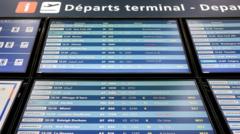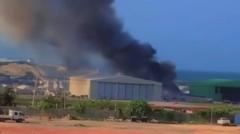The incident raises safety concerns about one of the most popular aircraft models in the world, prompting an investigation.
Boeing 737-800 Crash in South Korea: Ongoing Investigation into Cause

Boeing 737-800 Crash in South Korea: Ongoing Investigation into Cause
A suspected bird strike may have contributed to a recent crash of a widely-used Boeing 737-800 operated by Jeju Air.
The Jeju Air Boeing 737-800 that crashed in southwestern South Korea is part of a model widely recognized in the global aviation industry. Data reveals that approximately 28,000 passenger aircraft are currently in operation worldwide, with 15 percent, or around 4,400, being Boeing 737-800s. This model belongs to Boeing's Next-Generation 737 family, which prepares the way for the more advanced 737 Max, a series linked to two catastrophic accidents over five years ago that resulted in a worldwide grounding of its fleet.
Over 200 airlines utilize the 737-800, including five in South Korea—Jeju Air, T’way Air, Jin Air, Eastar Jet, and Korean Air. Known for its reliability, the aircraft has gained immense popularity across regions such as Asia, Europe, and North America, with Boeing having delivered approximately 5,000 units since its introduction in 1998.
"The aircraft noted in this incident has a solid safety history," states Najmedin Meshkati, a professor specializing in engineering at the University of Southern California, who has explored the safety record of the Boeing 737 line extensively. The age of the global fleet of 737-800s varies widely, ranging from just five years to over 27 years. Expert maintenance can allow these jets to fly for 20-30 years or longer. Notably, the aircraft that crashed was manufactured 15 years ago and was initially operated by Ryanair in Europe before being leased to Jeju Air in 2017 by SMBC Aviation Capital.
Investigators are looking into various potential causes of the crash, with initial speculation focusing on a possible bird strike that may have resulted in a landing gear malfunction. Boeing confirmed its readiness to assist Jeju Air following the incident, expressing concern for the affected parties.
Bird strikes, though not uncommon, can pose risks to aircraft operations. While some incidents lead to cracked windshields, measures are often taken at airports to mitigate these risks. Muan International Airport, the crash site, employs tactics like audio distress calls and even falconry to deter birds from its airspace.
Meshkati emphasized that the 737-800's landing gear is well-engineered with a history of reliable performance, although he noted that poor maintenance could lead to deployment issues. He urged caution against premature conclusions regarding the causes of such accidents. Investigations into aviation accidents are intricate and typically reveal multiple contributing factors, which may take years to fully understand.
As authorities continue their investigation, the aviation community watches closely for updates on this significant incident.
Over 200 airlines utilize the 737-800, including five in South Korea—Jeju Air, T’way Air, Jin Air, Eastar Jet, and Korean Air. Known for its reliability, the aircraft has gained immense popularity across regions such as Asia, Europe, and North America, with Boeing having delivered approximately 5,000 units since its introduction in 1998.
"The aircraft noted in this incident has a solid safety history," states Najmedin Meshkati, a professor specializing in engineering at the University of Southern California, who has explored the safety record of the Boeing 737 line extensively. The age of the global fleet of 737-800s varies widely, ranging from just five years to over 27 years. Expert maintenance can allow these jets to fly for 20-30 years or longer. Notably, the aircraft that crashed was manufactured 15 years ago and was initially operated by Ryanair in Europe before being leased to Jeju Air in 2017 by SMBC Aviation Capital.
Investigators are looking into various potential causes of the crash, with initial speculation focusing on a possible bird strike that may have resulted in a landing gear malfunction. Boeing confirmed its readiness to assist Jeju Air following the incident, expressing concern for the affected parties.
Bird strikes, though not uncommon, can pose risks to aircraft operations. While some incidents lead to cracked windshields, measures are often taken at airports to mitigate these risks. Muan International Airport, the crash site, employs tactics like audio distress calls and even falconry to deter birds from its airspace.
Meshkati emphasized that the 737-800's landing gear is well-engineered with a history of reliable performance, although he noted that poor maintenance could lead to deployment issues. He urged caution against premature conclusions regarding the causes of such accidents. Investigations into aviation accidents are intricate and typically reveal multiple contributing factors, which may take years to fully understand.
As authorities continue their investigation, the aviation community watches closely for updates on this significant incident.



















